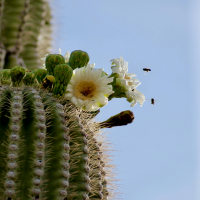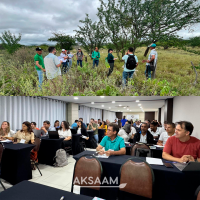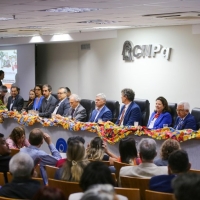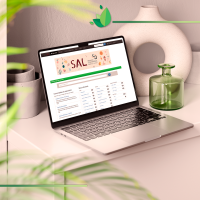Notícias
Processamento de gergelim deve aumentar renda de 40 famílias agricultoras do Alto Sertão Sergipano
Em meio ao Alto Sertão de Sergipe, região semiárida do nordeste brasileiro, as sementes de gergelim trouxeram esperança e motivação para mais de 40 famílias agricultoras vinculadas ao Projeto Algodão em Consórcios Agroecológicos no estado. Isso porque já é possível ver a comercialização de produtos em transição para a certificação orgânica participativa a partir da oleaginosa. Entre eles estão o óleo, gergelim natural, gergelim granulado e tahine, uma pasta de sementes com alto valor nutricional e comumente consumida em pães, biscoitos e torradas.

For the farmer Maria Aparecida da Silva, 57, known as Cida, who is linked to the Participatory Organic Certification Association of Alto Sertão de Sergipe (ACOPASE), it will be possible to generate income and encourage healthy eating habits for the population, since that sesame seeds are grown without pesticides and in compliance with the requirements of participatory organic certification. “We have a lot of sesame, so my expectation is to produce more oil from this food. We want to add even more value to our product. Other farming families want to produce the oil for a healthier diet”, says Cida.
Just to give you an idea, the cultivation of sesame in the country increased by 230% in just one year, according to data from the Brazilian Agricultural Research Corporation (EMBRAPA). In the last ten years, the increase in production was about 20 times greater than the five thousand tons registered in 2010. In observation of the potential of this food, the coordinator of the Cotton Project in Agroecological Consortia of Diaconia, Fábio Santiago, explains that the The grain improvement initiative is a strategy to advance the value chain of products such as sesame on an agroecological basis.
“The main idea is to make the polyculture, where cotton occupies 50%, serve for food security and enter the commercialization to increase the income of farming families. In addition, we want to contribute to the supply of healthier foods to the local population, considering that the sesame seed occupies a very important nutritional position for people's diet, being rich in fiber, protein, phosphorus, magnesium, calcium, among others”, observes Santiago.

The sesame processing process, which consists of transforming the seeds into products for consumption, was made possible by the Cotton Project in Agroecological Consortia, coordinated by Diaconia, and in partnership with the Federal University of Sergipe (UFS) – Campus Sertão – Nossa Senhora da Glória/SE and the Dom José Brandão de Castro Center (CDJBC). Thus, the initiative enabled the purchase of equipment adapted to family farming for the production of oil and other products derived from the oilseed, through resources from the Productive and Environmental Incentive Fund – FIPA.
Among the equipment acquired are a stainless steel table, digital scale, press for extracting the oil, packaging for the products, roaster for the production of roasted sesame and a blower for closing packages. “This is part of a survey carried out in the territories and which has also been contributing in a network with other Participatory Organizations for Organic Conformity Assessment (OPACs), from the logo to the issue of packaging and labeling. This will contribute to bringing the commercialization via ACOPASE closer to the local civil society”, he says.

In addition, a workshop was given by research professors in the field of agronomy and agroindustry at UFS/Campus Sertão for guidance on cleaning, post-harvest quality and grain selection, care with food handling and procedures for closing packages. According to UFS professor Maycon Reis, one of the organizers of the workshop, “the aim was to train ACOPASE members so that they can make professional use of these technologies to add value to their products. We are confident that this year's harvest will see a very large increase in production, as farmers see that the product will benefit them in the association to which they belong. So,
The choice to benefit the sesame is justified by the ease of treatment of the grains and without the need for registration, given that there is no increase in external inputs. “Inside the swidden we have other grains, but the choice of sesame has a very strategic aspect, as Fábio Santiago, coordinator of the Cotton Project, says, and we agree with him, because the processing is more simplified, there is no addition of other ingredients. In addition, it has low management costs and has adapted very well to the territory, within the cotton cycle”, observes Prof. Maycon Reis.

The workshop was aimed at farmers linked to ACOPASE, which, with the support of the Cotton Project, is structuring the value chain of the consortium's products to generate the Brazilian Organic Seal. Just to give you an idea, farming families produce other food crops in consortium with cotton, such as corn, beans, sunflowers, peanuts, pork beans and cowpeas, demonstrating the diversity of production and the high capacity of managing the family farming.
“For the association, it means a great advance in terms of the organization of internal activities, but also for those outside ACOPSE. Today we have the cotton lint that we already sell. Some farmers sell beans and corn at street markets and in the peasant basket of the Movimento dos Pequenos Agricultores (MPA). and graduated in agroecology, Iva de Jesus.
The training actions of UFS in the processing of sesame in favor of strengthening ACOPASE enhance the integration of the use of hand-saving technologies in agroecological cotton consortia in productive family units (UFPs), controlled by the Participatory Guarantee System (SPG), such as mini tractors, planters, brush cutters and aspirating harvesters. In this way, from the partnership with the International Fund for Agricultural Development (IFAD) -United Nations (UN), through AKASAAM/IPPDS/UFV/FUNARBE, it was possible to invest in technologies for family farming, generating a reduction in labor work, autonomy of land preparation, higher rate of use of rain, less impact on the soil and greater use of organic matter. Consequently,
Cotton Project in Agroecological Consortia– It is an initiative coordinated by Diaconia, in a strategic partnership with the Federal University of Sergipe (UFS, Campus Sertão – Nossa Senhora da Glória/SE). The Project has financial support from the Laudes Foundation, the Inter-American Foundation (IAF) and FIDA/AKSAAM/UFV/IPPDS/FUNARBE. The Project is also a partner with Projeto + Algodão – FAO/MRE-ABC/Government of Paraguay/IBA. To implement the Project in the territories, Diaconia has established partnerships with local NGOs with experience in Agroecology that will be responsible for providing technical advice to strengthen the Participatory Organizations for Organic Conformity Assessment (OPACs) and agroecological production. In Sertão do Piauí, Cáritas Diocesana de São Raimundo Nonato develops activities in Serra da Capivara. In the Sertão do Cariri, in Paraíba, The work is being carried out by Arribaçã, in partnership with CEOP – Território do Curimataú/Seridó da Paraíba. In Sertão do Araripe, in Pernambuco, the NGOs CAATINGA and Chapada jointly assumed the actions of the Project. The activities in Alto Sertão de Alagoas and Alto Sertão de Sergipe are in charge of Instituto Palmas and Centro Dom José Brandão de Castro (CDJBC), respectively. In Sertão do Pajeú (PE) and Oeste Potiguar (RN), territories where Diaconia already has offices and activities, it is in charge of implementing the local actions of the Project and in partnership with CPT – RN. The activities in Alto Sertão de Alagoas and Alto Sertão de Sergipe are in charge of Instituto Palmas and Centro Dom José Brandão de Castro (CDJBC), respectively. In Sertão do Pajeú (PE) and Oeste Potiguar (RN), territories where Diaconia already has offices and activities, it is in charge of implementing the local actions of the Project and in partnership with CPT – RN. The activities in Alto Sertão de Alagoas and Alto Sertão de Sergipe are in charge of Instituto Palmas and Centro Dom José Brandão de Castro (CDJBC), respectively. In Sertão do Pajeú (PE) and Oeste Potiguar (RN), territories where Diaconia already has offices and activities, it is in charge of implementing the local actions of the Project and in partnership with CPT – RN.
Reportagem: Acsa Macena






